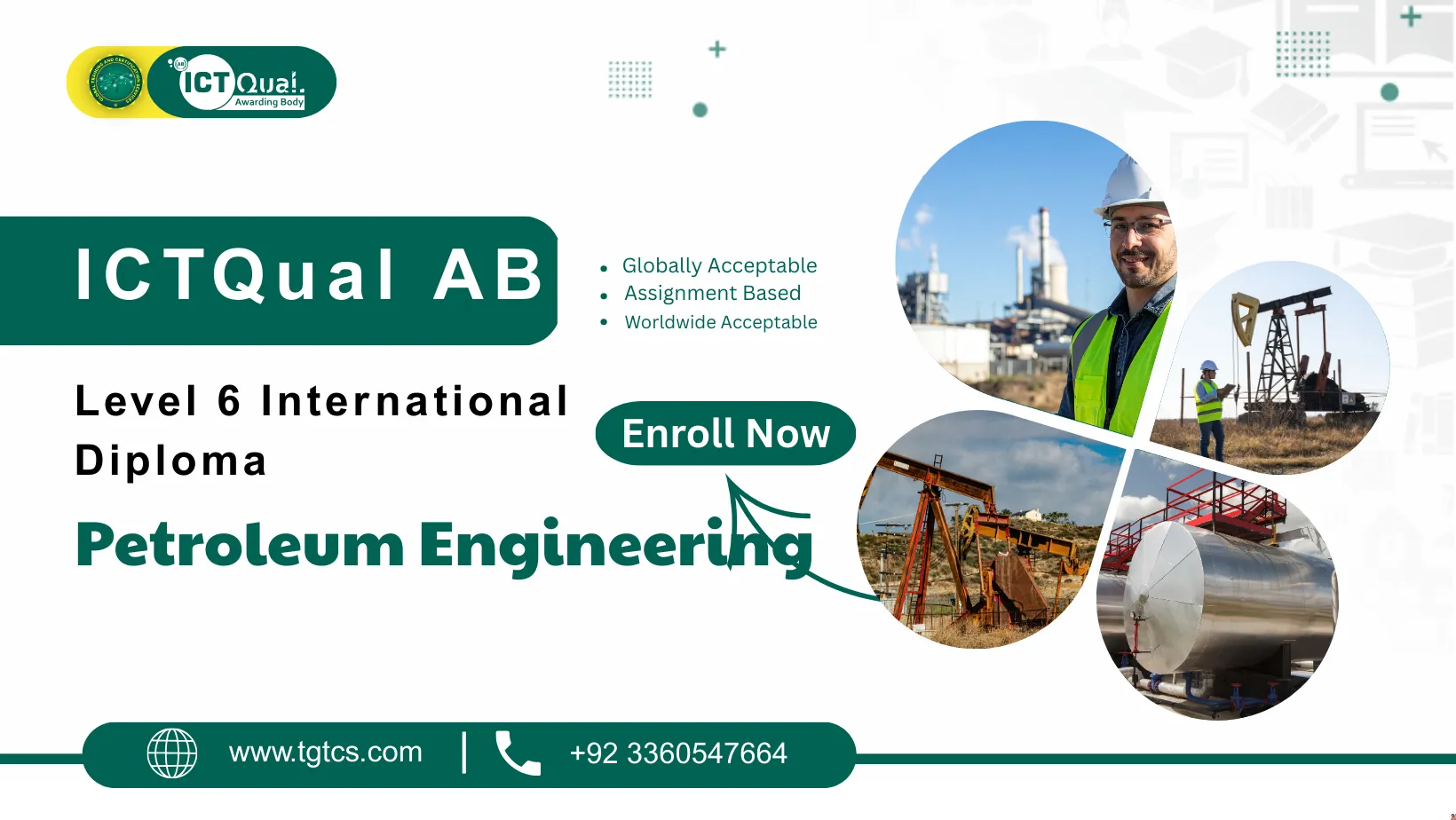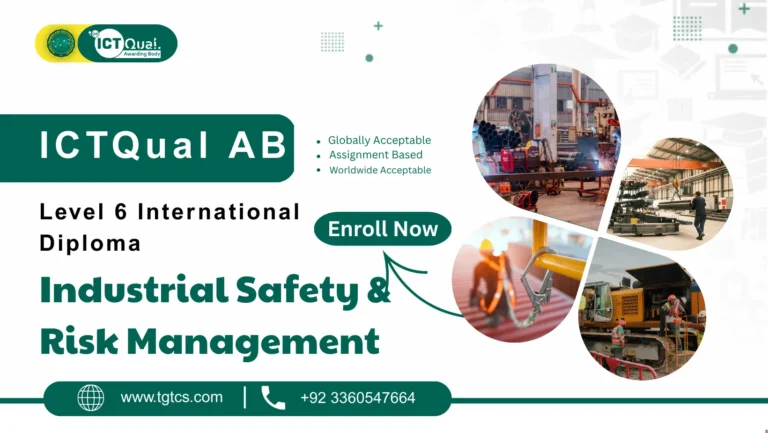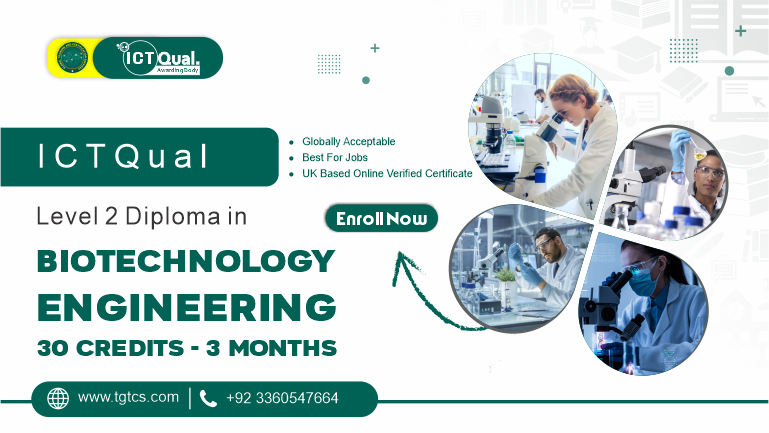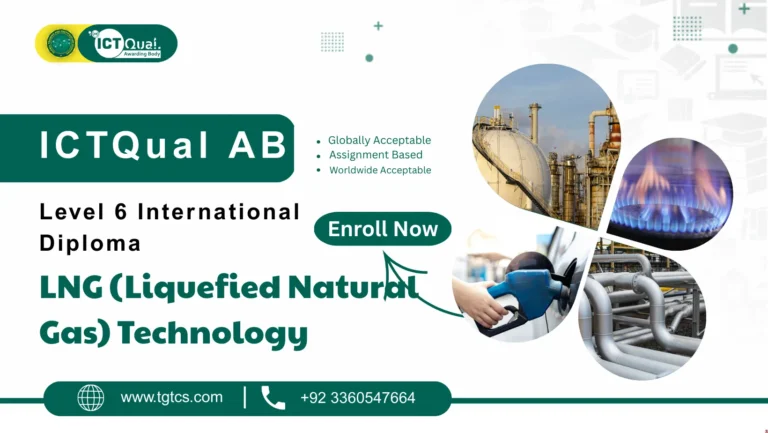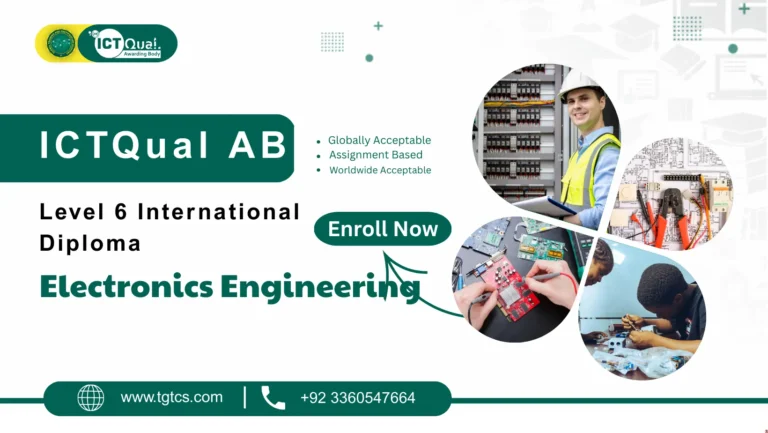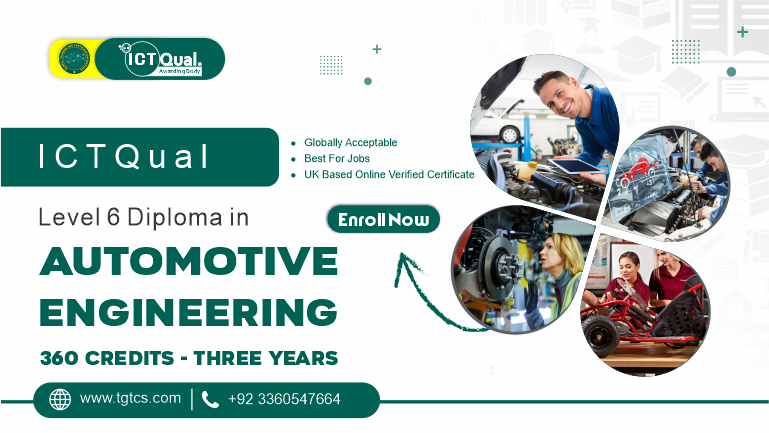ICTQual AB Level 6 International Diploma in Petroleum Engineering
The ICTQual AB Level 6 International Diploma in Petroleum Engineering is a prestigious qualification designed to equip learners with advanced technical knowledge, practical skills, and strategic expertise essential for a successful career in the global oil and gas industry. With the increasing demand for energy resources and the growth of the petroleum sector worldwide, skilled petroleum engineers are critical for exploration, production, and efficient management of hydrocarbon resources. This diploma prepares learners to meet these industry demands by providing a comprehensive understanding of petroleum engineering principles and practices.
This program covers a broad range of topics including reservoir engineering, drilling and production technology, petroleum geology, oil and gas project management, enhanced oil recovery techniques, and health, safety, and environmental practices in the energy sector. Learners will also gain practical skills in simulation, modeling, and petroleum production optimization, ensuring they can apply theoretical knowledge to real-world energy challenges. By combining advanced engineering concepts with hands-on assignments, the diploma enables learners to develop problem-solving, analytical, and decision-making abilities essential for petroleum industry operations.
The ICTQual AB Level 6 International Diploma in Petroleum Engineering is suitable for both fresh graduates and experienced professionals. Fresh learners complete all mandatory assignments to gain a solid foundation in petroleum engineering, while experienced professionals with verifiable work experience can fast-track the qualification by demonstrating expertise in professional discussion meetings with an ICTQual AB approved assessor. The diploma is globally recognized, British Council verifiable, and MOFA/Embassy attested, offering internationally credible credentials for employment, career advancement, and professional development.
By completing this diploma, learners acquire the technical, managerial, and analytical competencies required to excel in petroleum engineering roles, including reservoir engineer, drilling engineer, production engineer, and project manager, enabling them to contribute effectively to the energy and oil and gas sectors worldwide.
The Global Training and Certification Services is Approved Training Centre of ICTQual AB UK Ltd
Course Level and Credits
The ICTQual AB Level 6 International Diploma in Petroleum Engineering is a prestigious qualification offering 360 credits, reflecting its comprehensive curriculum and advanced level of study. This fully assignment-based program ensures learners gain in-depth understanding of reservoir engineering, drilling and production technology, petroleum geology, enhanced oil recovery techniques, and oil and gas project management. The Level 6 diploma is internationally recognized, making it a highly respected credential for professionals seeking career advancement in the global energy sector.
Mode of Study
This diploma offers flexible, self-paced learning that allows learners to study from anywhere in the world. The fully assignment-based structure eliminates rigid classroom schedules, enabling learners to progress at their own pace while applying theoretical knowledge to practical petroleum engineering challenges. This flexibility ensures a seamless learning experience for working professionals, international students, and individuals balancing multiple commitments.
Global Recognition & Attestation
The ICTQual AB Level 6 International Diploma in Petroleum Engineering is British Council verifiable and MOFA/Embassy attested, providing international credibility. Graduates gain qualifications recognized by employers, regulatory authorities, and academic institutions worldwide, enhancing employment opportunities and eligibility for iqama approval in Gulf countries.
Eligibility and Flexibility
This qualification is suitable for both fresh graduates and experienced professionals. Fresh learners are required to complete all 36 mandatory assignments within three years to acquire comprehensive knowledge and skills. Experienced professionals with at least six years of verifiable relevant experience can fast-track the diploma by demonstrating their expertise in professional discussion meetings with an ICTQual AB approved assessor, bypassing the need to complete all assignments.
Skills and Knowledge Gained
Learners acquire technical and professional skills in reservoir analysis, drilling and production engineering, petroleum project management, petroleum geology, and health, safety, and environmental practices. The diploma also develops analytical, problem-solving, and decision-making abilities essential for petroleum industry operations.
Career Benefits
Graduates are prepared for high-demand roles such as reservoir engineer, drilling engineer, production engineer, petroleum project manager, and oil and gas consultant. With internationally recognized certification and verified professional competencies, learners can secure positions in multinational energy corporations, oilfield service companies, and research institutions.
Mandatory Unit
This qualification, the ICTQual AB Level 6 International Diploma in Petroleum Engineering, consists of 36 mandatory units.
Year 1 – Foundation in Petroleum Engineering
- Principles of Petroleum Engineering
- Engineering Mathematics
- Fundamentals of Mechanical and Electrical Engineering
- Introduction to Petroleum Geology
- Drilling Engineering Fundamentals
- Engineering Drawing and Computer-Aided Design (CAD)
- Basics of Reservoir Engineering
- Well Logging and Formation Evaluation
- Health, Safety, and Environmental Practices in Petroleum Engineering
- Communication and Technical Report Writing
- Introduction to Project Management in Engineering
- Introduction to Oil & Gas Industry Operations
Year 2 – Intermediate Studies in Petroleum Engineering
- Advanced Drilling and Well Control
- Reservoir Rock and Fluid Properties
- Production Engineering and Well Completion
- Petroleum Facilities and Pipeline Engineering
- Applied Thermodynamics and Fluid Mechanics
- Petroleum Project Planning and Management
- Oil & Gas Exploration Techniques
- Enhanced Oil Recovery Methods
- Industrial Maintenance and Reliability in Petroleum Operations
- Applied Research Methods in Petroleum Engineering
- Sustainable Practices and Environmental Management in Petroleum
- Oil and Gas Economics and Cost Control
Year 3 – Advanced Studies in Petroleum Engineering
- Advanced Reservoir Simulation and Modelling
- Petroleum Production Systems and Optimisation
- Offshore and Subsea Engineering
- Advanced Drilling Technology and Well Intervention
- Advanced Fluid Flow and Multiphase Systems
- Petroleum Safety, Risk, and Quality Management
- Smart Technologies and Industry 4.0 in Oil & Gas
- Robotics and Automation in Petroleum Operations
- Cyber-Physical Systems and IoT in Petroleum Engineering
- Professional Ethics and Sustainability in Petroleum Engineering
- Innovation and Entrepreneurship in Oil & Gas Technology
- Final Year Major Project (Capstone Project)
The ICTQual AB Level 6 International Diploma in Petroleum Engineering equips learners with advanced technical knowledge, practical skills, and professional competencies across the oil and gas sector. Each unit is designed to provide theoretical understanding, applied learning, and industry-relevant expertise, preparing graduates to excel in petroleum engineering roles globally.
Year 1 – Foundation in Petroleum Engineering
Principles of Petroleum Engineering
- Understand fundamental petroleum engineering concepts, processes, and industry structure
- Explore the lifecycle of oil and gas production and exploration
- Apply engineering principles to solve basic petroleum industry problems
- Develop awareness of global petroleum industry trends and standards
Engineering Mathematics
- Apply mathematical methods to solve engineering problems
- Use calculus, algebra, and statistics for petroleum engineering applications
- Model engineering processes using quantitative techniques
- Interpret and analyze data for informed decision-making
Fundamentals of Mechanical and Electrical Engineering
- Understand core mechanical and electrical principles relevant to oil and gas operations
- Apply engineering concepts to equipment design and maintenance
- Explore energy systems and mechanical processes in petroleum facilities
- Develop skills for integrating mechanical and electrical solutions in petroleum projects
Introduction to Petroleum Geology
- Understand the formation, distribution, and characteristics of hydrocarbon reservoirs
- Analyze geological data for exploration and production
- Apply geological knowledge to reservoir assessment and drilling planning
- Evaluate rock formations and hydrocarbon potential
Drilling Engineering Fundamentals
- Understand drilling methods, equipment, and well design
- Apply basic drilling calculations and operational planning
- Learn wellbore construction, casing, and completion techniques
- Recognize common drilling challenges and safety protocols
Engineering Drawing and Computer-Aided Design (CAD)
- Develop technical drawing and visualization skills for petroleum equipment
- Use CAD tools to create accurate engineering schematics
- Apply drawing principles to design petroleum structures and components
- Interpret engineering drawings for operational and maintenance purposes
Basics of Reservoir Engineering
- Understand reservoir properties, fluid flow, and pressure behavior
- Apply fundamental reservoir calculations for production forecasting
- Analyze reservoir performance and recovery methods
- Develop basic skills for reservoir management
Well Logging and Formation Evaluation
- Interpret well logging data to assess reservoir conditions
- Understand formation evaluation techniques and tools
- Analyze rock and fluid properties from well logs
- Apply insights for drilling and production decisions
Health, Safety, and Environmental Practices in Petroleum Engineering
- Recognize hazards and implement safety protocols in petroleum operations
- Understand environmental regulations and sustainable practices
- Apply risk assessment and mitigation strategies
- Promote a culture of safety and responsibility
Communication and Technical Report Writing
- Develop professional report writing and documentation skills
- Communicate technical findings effectively to stakeholders
- Prepare clear, concise, and structured reports
- Enhance verbal and written communication for project presentations
Introduction to Project Management in Engineering
- Understand project management principles and methodologies
- Plan, schedule, and monitor engineering projects efficiently
- Apply risk, cost, and resource management techniques
- Evaluate project outcomes and implement improvements
Introduction to Oil & Gas Industry Operations
- Gain an overview of upstream, midstream, and downstream operations
- Understand exploration, production, and refining processes
- Explore operational challenges and technological solutions
- Apply knowledge to real-world petroleum industry scenarios
Year 2 – Intermediate Studies in Petroleum Engineering
Advanced Drilling and Well Control
- Apply advanced drilling techniques and well control procedures
- Analyze drilling parameters for operational efficiency
- Implement safety and risk management in well operations
- Solve complex drilling challenges using industry best practices
Reservoir Rock and Fluid Properties
- Study detailed rock and fluid characteristics in reservoirs
- Analyze capillary pressure, porosity, and permeability
- Understand fluid phase behavior and its impact on production
- Apply laboratory and field data for reservoir modeling
Production Engineering and Well Completion
- Design well completions and optimize production techniques
- Implement artificial lift methods for enhanced recovery
- Monitor and evaluate production performance
- Apply best practices for sustainable and efficient production
Petroleum Facilities and Pipeline Engineering
- Understand design, operation, and maintenance of petroleum facilities
- Apply pipeline engineering principles for safe transport
- Analyze facility performance and optimize processes
- Implement safety and environmental compliance measures
Applied Thermodynamics and Fluid Mechanics
- Apply thermodynamic and fluid flow principles in petroleum systems
- Solve energy, pressure, and flow-related engineering problems
- Analyze multiphase flow in wells and pipelines
- Integrate theoretical knowledge into operational applications
Petroleum Project Planning and Management
- Plan and manage petroleum projects effectively
- Apply budgeting, scheduling, and resource allocation techniques
- Conduct risk assessment and project feasibility analysis
- Evaluate project performance and implement corrective actions
Oil & Gas Exploration Techniques
- Learn seismic, geophysical, and geological exploration methods
- Analyze exploration data to identify hydrocarbon prospects
- Apply modern exploration tools and technologies
- Develop skills for efficient resource identification
Enhanced Oil Recovery Methods
- Understand primary, secondary, and tertiary recovery techniques
- Apply chemical, thermal, and gas injection methods
- Optimize reservoir recovery efficiency
- Evaluate economic and operational feasibility of EOR projects
Industrial Maintenance and Reliability in Petroleum Operations
- Implement maintenance strategies for equipment reliability
- Analyze failure modes and preventive measures
- Apply reliability engineering principles in petroleum operations
- Optimize maintenance planning and scheduling
Applied Research Methods in Petroleum Engineering
- Conduct research using scientific and engineering methodologies
- Collect, analyze, and interpret petroleum engineering data
- Apply research findings to practical industry problems
- Develop critical thinking and evidence-based decision-making skills
Sustainable Practices and Environmental Management in Petroleum
- Implement environmentally responsible engineering practices
- Understand regulations and sustainability standards in oil and gas
- Develop strategies for minimizing environmental impact
- Apply sustainable solutions in petroleum operations
Oil and Gas Economics and Cost Control
- Analyze economic factors affecting petroleum projects
- Implement cost estimation, control, and budgeting techniques
- Evaluate project profitability and investment decisions
- Apply financial principles to operational optimization
Year 3 – Advanced Studies in Petroleum Engineering
Advanced Reservoir Simulation and Modelling
- Develop sophisticated reservoir simulation models
- Predict production performance under various scenarios
- Analyze reservoir behavior using computational tools
- Optimize recovery strategies based on simulation outcomes
Petroleum Production Systems and Optimisation
- Design and optimize integrated production systems
- Apply artificial lift, flow assurance, and surface processing techniques
- Monitor production for efficiency and safety
- Implement strategies for maximizing hydrocarbon recovery
Offshore and Subsea Engineering
- Understand offshore platform design and subsea engineering principles
- Apply engineering solutions for deepwater operations
- Implement safety and environmental measures for offshore projects
- Analyze subsea system performance and reliability
Advanced Drilling Technology and Well Intervention
- Apply cutting-edge drilling technologies and well intervention methods
- Optimize drilling efficiency and safety protocols
- Solve complex operational challenges using advanced techniques
- Evaluate intervention strategies for production enhancement
Advanced Fluid Flow and Multiphase Systems
- Analyze multiphase flow in wells, pipelines, and surface facilities
- Apply advanced fluid mechanics to operational scenarios
- Solve flow assurance challenges in complex systems
- Optimize transport and production efficiency
Petroleum Safety, Risk, and Quality Management
- Implement advanced safety and risk management strategies
- Conduct hazard identification, risk assessment, and mitigation
- Ensure quality assurance and compliance in operations
- Promote a culture of safety and operational excellence
Smart Technologies and Industry 4.0 in Oil & Gas
- Explore digital oilfield technologies and smart systems
- Apply IoT, automation, and data analytics in petroleum operations
- Optimize production and maintenance using Industry 4.0 tools
- Integrate emerging technologies for operational efficiency
Robotics and Automation in Petroleum Operations
- Understand robotic systems for exploration, production, and maintenance
- Apply automation to improve safety and operational performance
- Develop solutions for remote and hazardous operations
- Evaluate the impact of robotics on cost and efficiency
Cyber-Physical Systems and IoT in Petroleum Engineering
- Implement cyber-physical systems for monitoring and control
- Utilize IoT for data-driven decision-making in oil and gas operations
- Enhance operational efficiency and predictive maintenance
- Integrate smart technologies into petroleum workflows
Professional Ethics and Sustainability in Petroleum Engineering
- Understand ethical standards and corporate responsibility in petroleum operations
- Apply sustainable practices in exploration, production, and management
- Promote professional integrity and transparency
- Evaluate long-term environmental and social impacts of projects
Innovation and Entrepreneurship in Oil & Gas Technology
- Develop entrepreneurial skills for technology and business innovation
- Identify market opportunities for petroleum engineering solutions
- Apply innovation to operational and technological challenges
- Evaluate feasibility and implement cutting-edge solutions
Final Year Major Project (Capstone Project)
- Conduct a comprehensive research or practical project in petroleum engineering
- Apply cumulative knowledge and skills acquired throughout the diploma
- Present findings, solutions, and recommendations to stakeholders
- Demonstrate professional competence, critical thinking, and problem-solving abilities
The ICTQual AB Level 6 International Diploma in Petroleum Engineering offers learners globally recognized credentials, advanced technical knowledge, and practical skills essential for a successful career in the oil and gas industry. This qualification empowers professionals and fresh graduates to excel in petroleum engineering, project management, and energy sector operations.
Advanced Technical Knowledge
- Gain in-depth understanding of reservoir engineering, drilling technology, and production optimization
- Develop expertise in offshore, subsea, and petroleum facilities engineering
- Learn advanced fluid flow, multiphase systems, and reservoir simulation techniques
- Understand petroleum geology, exploration methods, and enhanced oil recovery strategies
Practical and Professional Skills
- Apply engineering principles to real-world oil and gas challenges
- Develop problem-solving, analytical, and decision-making capabilities
- Gain project management, technical reporting, and operational planning skills
- Master safety, risk assessment, and environmental compliance in petroleum operations
Global Recognition and Credibility
- Fully assignment-based program allowing self-paced learning from anywhere in the world
- British Council verifiable, MOFA and Embassy attested for international credibility
- Highly valuable for employment, career advancement, and iqama approval in Gulf countries
- Provides internationally recognized qualifications trusted by employers and regulatory authorities
Career Advancement Opportunities
- Prepare for high-demand roles such as reservoir engineer, drilling engineer, production engineer, and petroleum project manager
- Enhance employability in multinational oil and gas corporations, consultancy firms, and energy research institutions
- Acquire leadership and managerial skills for overseeing petroleum operations and projects
- Build a strong foundation for long-term career growth in the global petroleum industry
By completing the ICTQual AB Level 6 International Diploma in Petroleum Engineering, learners gain internationally recognized expertise, practical competencies, and professional credibility, enabling them to pursue rewarding careers, contribute effectively to petroleum operations, and excel in the global oil and gas sector.
The ICTQual AB Level 6 International Diploma in Petroleum Engineering is designed for learners from diverse backgrounds who aspire to excel in petroleum engineering, oil and gas operations, and energy sector management.
Aspiring Petroleum Engineers
- Professionals seeking to build advanced knowledge in drilling, reservoir management, and production operations.
- Individuals aiming to develop practical skills for upstream and downstream petroleum activities.
Industry Professionals
- Professionals looking to enhance technical expertise and qualify for senior engineering or management roles.
- Individuals seeking to strengthen strategic understanding of oil and gas sector operations, safety, and compliance.
Engineering and Geoscience Graduates
- Recent graduates in engineering, geology, or geosciences aiming to gain specialized knowledge and hands-on experience.
- Learners seeking to improve employability and career prospects in exploration, production, or energy consultancy roles.
Energy Sector Consultants and Analysts
- Professionals managing oil and gas projects who want to deepen their understanding of advanced analytical and technical principles.
- Individuals seeking expertise in project evaluation, risk management, and sustainable petroleum practices.
International and Gulf-based Professionals
- Professionals aiming for career advancement, employment, and certifications recognized internationally and in Gulf countries.
- Learners seeking globally accredited qualifications verified by British Council, MOFA, and Embassy attested.
This diploma is ideal for learners who want to combine technical mastery, practical experience, and strategic knowledge to pursue rewarding careers as petroleum engineers, energy consultants, or project managers globally.
Course Overview
Course Level
Level 6
Course Units
36 Units
Credits
360
Duration
3 years
